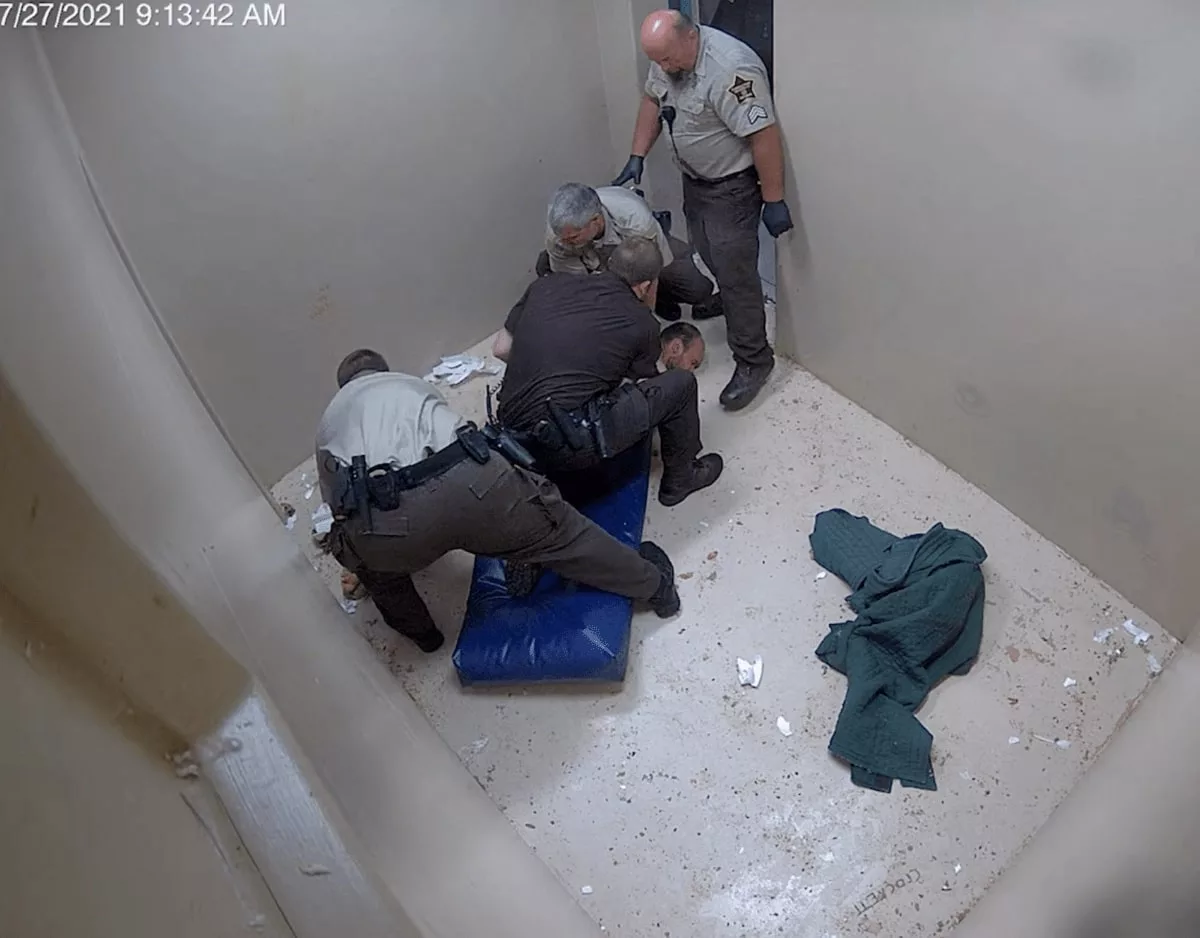Indiana Jail Let Man With Schizophrenia Starve to Death in Solitary, Lawsuit Alleges
Graphic video footage obtained by The Appeal shows 29-year-old Joshua McLemore wasting away and rolling in his own waste in the Jackson County Jail before eventually dying of malnutrition.

Jackson County Sheriff’s Office employees in Indiana locked a man having a psychotic episode in solitary confinement for three weeks—without mental health care or even toilet access—until he died of malnutrition, according to a lawsuit filed today and video footage of the incident obtained by The Appeal.
On July 20, 2021, apartment managers entered 29-year-old Indiana resident Joshua McLemore’s home, found him confused, incoherent, and nude on the floor, and had McLemore transported to a Seymour, Indiana, hospital. McLemore’s mother had called her son’s living complex, worried he could have been having a psychotic episode. At the hospital, McLemore grabbed a nurse’s hair and the Seymour Police Department arrested him on battery charges.
At the Jackson County Jail, McLemore, who had schizophrenia, was stripped naked and thrown into solitary confinement in what was known as “Padded Cell 7,” a small room without toilet access.
Surveillance footage over 21 days shows him screaming; rocking back and forth; licking the walls; smearing his feces and urine all over the floor; violently shoving a plastic bottle into his rectum; throwing his food on the ground; and eating the styrofoam food trays that made their way through the thin slot at the cell door.
According to the lawsuit, he lost 45 pounds in less than a month. Jail staff rarely checked in on him. Jackson County Sheriff’s Office (JCSO) employees occasionally placed McLemore in restraints and wheeled him into a shower as JCSO forced other imprisoned people to clean the excrement in his cell. On August 8, a guard named Beverly texted her supervisor, “Just bathed him. And he can’t hold his hands, legs, anything. He’s dead weight.”
In the footage, McLemore’s body visibly shrinks over weeks until he doesn’t have the strength to hold his head up.
“Get up, buddy,” a corrections officer asks. But he can’t. In one portion of the footage, a female guard sprays him with liquid soap and hoses him down so that he does not smell before EMS comes.
On August 8, jail officials noticed that McLemore—visibly emaciated and unable to hold up his body—likely needed medical care. But medical officials were unable to save him. According to a suit, doctors listed McLemore’s cause of death as “multiple organ failure due to refusal to eat or drink with altered mental status due to untreated schizophrenia.”
McLemore’s family alleges that at least 20 people, including Sheriff Rick Meyer, had access to roughly 400 hours of footage of McLemore wasting away in his cell. Edwin Budge, the family’s attorney, said he could not understand why no one called 911 earlier.
“I think that’s the million-dollar question,” Budge said. “I don’t think there’s a good answer. It’s a systemic deficiency that runs from the top down.” The family is suing the county, the sheriff’s office, and Advanced Correctional Healthcare, the for-profit medical company that cared for McLemore in jail, for allegedly violating McLemore’s civil rights.
Budge added that the incident was “not a mistake. This was day after day of neglect.”
McLemore is not the only person who died after being allegedly left without care in the Jackson County Jail. In 2021, 23-year-old Ta’Neasha Chappell died after she begged for help and repeatedly vomited blood inside the facility. The Louisville Courier-Journal previously reported that Indiana State Police had launched an investigation into McLemore’s death in 2021. The following year, prosecutors announced that no one would be criminally charged over the ordeal.
The sheriff’s office did not immediately respond to a request for comment. In an emailed statement, a spokesperson for Advanced Correctional Healthcare said that the company takes “criticisms of the care provided by our team seriously” but is prohibited by federal privacy laws from discussing individual medical cases.
The spokesperson’s email signature included a Bible quote.
“They also will answer, ‘Lord, when did we see you hungry or thirsty or a stranger or needing clothes or sick or in prison, and did not help you?’” the quote reads. “He will reply, ‘Truly I tell you, whatever you did not do for one of the least of these, you did not do for me.’ Matthew 25:44-45.”

McLemore was born in Gulfport, Mississippi. According to the suit, he liked reading and playing chess. His mother, Rhonda, was a single mother and a member of the US Navy. In high school, he started having mental health problems and was eventually diagnosed with schizophrenia. He was hospitalized repeatedly during his lifetime for mental health issues and fluctuated between periods of relative stability and mental illness and drug use. He moved to Seymour, Indiana, a town of about 20,000 people, in 2020.
But, by July 2021, McLemore’s condition had worsened again. After McLemore’s mother alerted the staff at her son’s apartment complex that he might be in trouble, facility managers called 911. Per the suit, emergency responders said McLemore had acted erratically, given the wrong name, and did not let medical personnel touch him.
After being coaxed into the ambulance, medical professionals reported that McLemore began chewing on the seatbelts and railings attached to his stretcher. Hospital records state that McLemore admitted to having used methamphetamine in the past. The drug is common in Southern Indiana—the area is known as the “honey hole” due to its reputation as a meth pipeline.
When a hospital nurse leaned in too closely to check on McLemore, the suit states that he pulled her hair. The hospital then called the Seymour Police Department, which shackled his arms and legs and carried him out wearing nothing but underwear. The suit states that McLemore bit the police’s car door as cops placed him inside.
Once at the Jackson County Jail, the suit states that JCSO and medical personnel failed to take McLemore’s baseline vital signs and instead threw him alone into a small, rectangular room with only a covered window in his cell door. Fluorescent lights blared overhead 24 hours a day. When McLemore arrived at the jail, the suit states that jail employees stripped him nude and left him in a corner of the cell. McLemore then began licking the walls and loudly asking, “Where am I?”
The UN considers more than 15 days in solitary to be torture. However, JCSO officials held McLemore in the cell for the next three weeks as a camera recorded him. The suit alleges that, even though Indiana law mandates that people held in solitary confinement must be let out of their cells for an hour each day, JCSO officials did not bother to do so. The jail is otherwise overcrowded—despite not having the facilities to care for people long-term, the jail, like many others around the country, houses people both pretrial and for prison stays. But Budge, the family’s attorney, stressed that overcrowding did not explain what happened to his client.
“Everyone just decided it was a problem for the next shift,” he said.
Jail staff placed McLemore on “medical observation,” which meant employees needed to check on him every 15 minutes. The cell contained a room with a toilet and sink, but officials left the door to that area locked. The suit alleges that McLemore was too mentally unwell to ask to use the bathroom. Instead, he used the floor.
“He walked barefoot in his own human waste, rolled around in it, and ate food from it,” the suit says. “He lay on a urine-covered mat and wrapped himself in a urine-soaked blanket. He did all of this in plain view of the guards who were supposed to be monitoring him every 15 minutes.”
McLemore barely slept, ate, or drank during his stay in the cell. According to the suit, jail logs state that McLemore retrieved just 19 of the drinks he was given during his 20-day stay at the facility. On August 8, the lawsuit says guards noticed McLemore’s condition had grown so poor that he likely needed medical care. He could not drink a bottle of Gatorade on his own and needed to be fed the drink by hand. Before being sent to the hospital, jail officials again washed him by pouring a few buckets of cold water over his body and scrubbing him with a towel. He was intubated upon arriving at the hospital and eventually diagnosed with multiple medical conditions, including a lack of oxygen in his blood, severe dehydration, and kidney failure.
The local hospital eventually decided it could not care for him, and McLemore was airlifted to an ICU in Cincinnati. His mother, Rhonda, traveled to the facility from Mississippi. And, on August 10, Rhonda McLemore decided she had no other option but to take her son off of life support and let him die.
Roughly 16 months later, Rhonda herself had a fatal heart attack. Her family believes she died of grief.
“They’re sure his awful death put a hole in her heart, and that’s what killed her,” Budge said.
The Appeal is publishing video of the incident with the approval of McLemore’s family. To watch the footage, click here.
This piece has been updated to include a statement from Advanced Correctional Healthcare.
